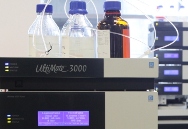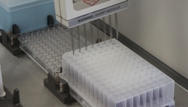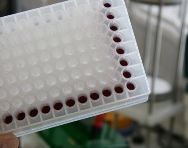Negative Chromatography Antibody Purification (N-CAP) Technology
With the advance of cell culture technology, higher and higher levels of protein expression have become a reality. For example, 10-20 gram / litre of antibody could be produced in mammalian cell broth in comparison to the previous 1 gram / litre level. Protein A affinity chromatography is the standard method for the capturing of antibodies in the bioprocessing industry. Currently this affinity chromatography technology has almost reached its physical capacity limit (e.g. 60-70 mg/ml resin). It won’t be cost-effective to purify such high-titer antibody (e.g. 10-30 g/ml titer) using Protein A media. In addition, the liquid-volume-reduction factor seen in the low-titer process will decease, i.e. the liquid volume after the Protein A step will be the same or even higher than the initial broth volume.
Protein A affinity medium is very costly and not very robust. Any kind of mishandling may mean a significant financial loss. The leaked protein ligand is another contaminant in the production stream and has to be removed by an extra chromatography step.
Alternative technologies such as crystallisation / precipitation, smart polymer adsorption and aqueous two-phase extraction are being explored and evaluated in the industry. However, none of the above techniques shows superior performance and, incorporating such techniques to the current manufacturing process is hugely challenging with respect to the engineering compatibility and operational efficiency.
When an antibody is expressed in high titers (e.g. 10-20 mg/ml), the combined content of the impurities such as host cell proteins, host cell DNA, virus, pigments and other small nutrition molecules (e.g. growth factors and cholesterol) becomes the minor quantity, i.e. much less than 50% in comparison to the content of the target antibody.
Instead of capturing the target antibody with expensive affinity media, we propose to capture the impurities but let the target antibody pass through. A group of ion-exchange and mixed-mode (multi-mode) ligand (MML) chromatography media with complementary binding spectrums can be deployed to efficiently capture all the impurities. This is called negative chromatography antibody purification (NCAP) technology. This type of media is very caustic-stable and much cheaper than protein A resins. The MML media generally has a much higher binding capacity as well. By adopting the NCAP technology, very cost-effective purification processes could be developed.
BioToolomics has built up a large mixed-mode ligand library (MMLL) against all the possible impurities. Mixed-mode resins are selected and screened at various conditions to achieve the full removal of the impurities. BioToolomics will then produce such specific chromatography resins for large-scale manufacturing applications.
BioToolomics would like to offer this unique platform technology to
biopharmaceutical companies to develop more efficient and cost-effective
purification processes.
For more information or possible collaborations, please contact us.




